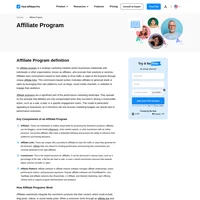Affiliate marketing is a form of marketing strategy that is often used interchangeably with referral marketing. However, the two are not the same, and it is essential to distinguish that these strategies are similar but different.
Referral marketing consists of an individual recommending products or services from a business to family, friends, or acquaintances. In contrast, affiliate marketing is when an individual offers products/services of a company to their audience, with which he/she has no close relationship.
Therefore, an affiliate program can be described as a form of marketing strategy where a person refers products or services to a particular audience/niche. Creating such a program improves the company’s sales, brand awareness, web traffic, conversion, email sign-up, etc.
How does an affiliate program work?
- Affiliates collaborate with advertisers
- Affiliates display ads on their platforms
- The audience browses the platform and clicks on ads
- Visitors are directed to the advertiser’s website
- Visitors buy/complete other action
- Affiliate system records this action
- Affiliates are tracked and credited for actions
- A commission is paid to affiliates by advertisers
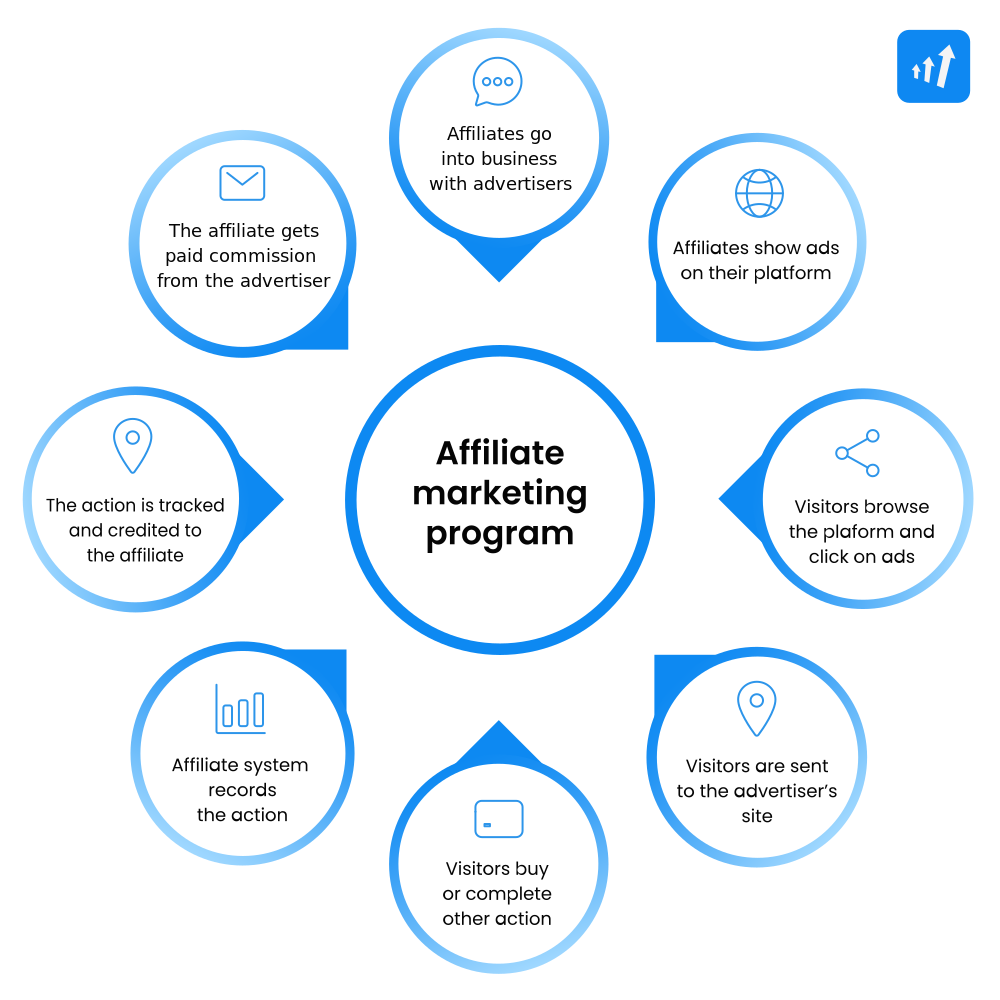
Types of affiliate programs
- Content programs
- Loyalty programs
- Email marketing programs
- Review website programs
What are the advantages of the affiliate program?
Direct relationship with affiliates
A significant advantage of having an affiliate program is the direct relationship with the affiliates, allowing you to communicate frequently. Therefore, you will ensure that affiliates align with your company’s objectives and both parties are satisfied. For instance, it is a good idea to stay in touch with your affiliates, particularly if they’re high performers. Hence, if a marketing campaign is not performing as planned, you can either improve the current promotional activities or adjust a deal/rate.
Providing marketing materials based on your objectives to affiliates
Providing marketing materials to affiliates might be an advantage for businesses that like to keep control and ensure that marketing campaigns are aligned with their business objectives. When you have an affiliate program rather than a network, it is easy to accomplish this goal.
Personal support
Since a third party is excluded, merchants and affiliates can communicate effortlessly. As a result, you can provide personal support to ensure a successful marketing campaign.
No third-party costs
Affiliate networks have many hidden costs such as first-time sign-up fees, monthly subscription fees, technical setup fees, and more. Over time, this can add up and take a chunk out of your affiliate sales. In contrast, affiliate programs will save your company money in the long run since third parties are not involved.
Flexibility
Last but not least is flexibility within your rules, terms & conditions. For instance, you can provide affiliates with flexible rates/deals without getting approval from a third party.

What are the disadvantages of the affiliate program?
As much as an affiliate program is great for most businesses, it can have downsides. Therefore, you should always consider key aspects and both pros and cons to ensure it is the right choice for your business.
Initially time-consuming
The first disadvantage is that it takes time to build an affiliate program. Even if you have the best resources, it will still take you more time and consideration than signing up for a network that handles it all for you. Therefore, you need to decide whether you want to build an affiliate program for your brand that will benefit you long-term or if you are just temporarily trying to increase sales and don’t want to invest much time and thought into it.
Initial investment cost
Another disadvantage is that the initial investment could be higher than when registering for an affiliate network. So, again, if you are considering affiliate marketing, you need to ask yourself whether you are interested in short-term or long-term results. If you are looking for a long-term investment, do not worry about the initial investment, as affiliate networks cost more in the long run. However, if you are looking for short-term results, investing in a program would be a costly mistake.
Limited amount of payout options
The third disadvantage could be that you have fewer payout options than a network. However, if you have feature-rich affiliate software, you can extend the payout options immensely. But, without it, it can pose a disadvantage to your business.
Best affiliate programs
Affiliate marketing is one of the best ways to monetize blog posts, Instagram account, YouTube channel, and other social media if you are a content creator. And because of that, it’s not a secret that the best and most efficient affiliates join programs that offer the highest commission fees.
To help you compare, we checked out several popular recurring affiliate programs of digital tools. Then, we picked the ones that stood out with high commission fees, long cookie durations, or the ones attracting thousands of affiliates per month. Keep reading to get to know which are, in our opinion, valuable sources of inspiration and popular among affiliates.
BigCommerce affiliate program
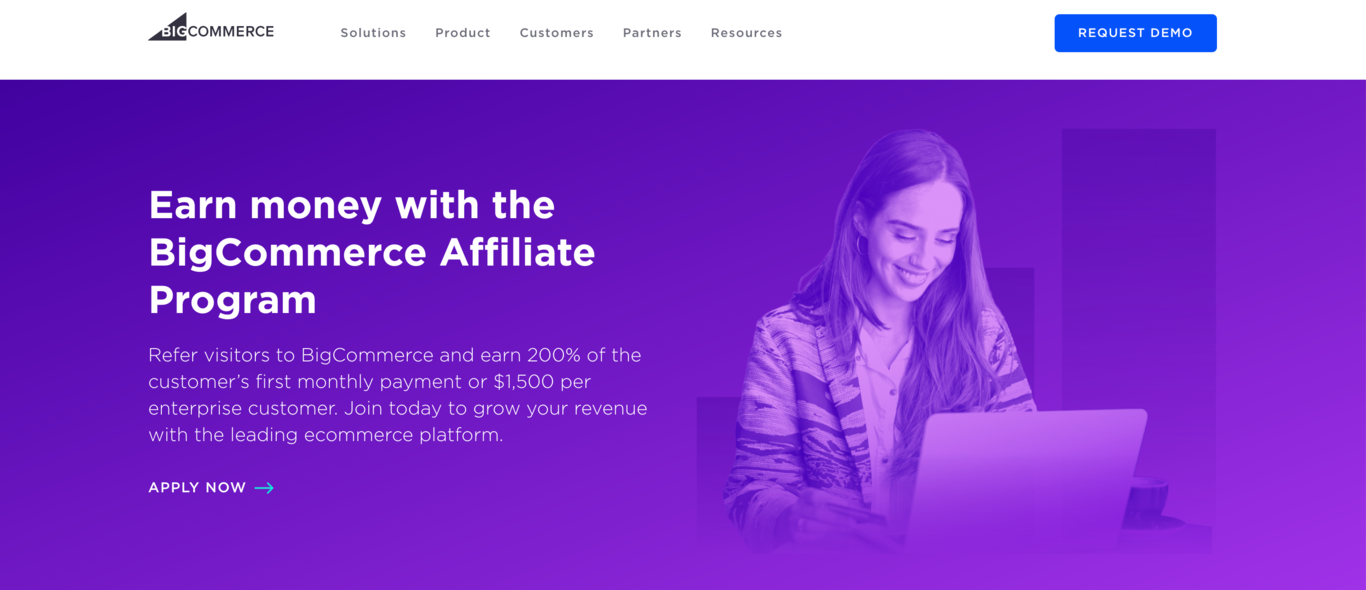
Commission: 200% of the customer’s first monthly payment or up to $1,500 for business client
Cookie duration: 90 days
Founded in 2009, BigCommerce is an online store builder that empowers thousands of e-commerce stores in more than 150 countries. It serves a wide variety of industries, including fashion, automotive, manufacturing, food, and healthcare.
When affiliates refer clients to BigCommerce, they can earn 200% of a customer’s first monthly payment (that’s up to $550 per referral!) or $1,500 per business customer.
Bluehost affiliate program

Commission: $65 per sale
Cookie duration: 90 days
Bluehost is a web hosting platform that supports over 2 million websites. In addition, this company runs an affiliate program that may be interesting to any business or entrepreneur looking to monetize their blog or website. If an affiliate promotes Bluehost’s products or services on their blog or website (either through banners or custom affiliate links), they can earn $65 for every sale generated from the website, which is an incredibly high rate.
Best of all, it’s free to join their affiliate program, and Bluehost offers reliable tracking to ensure affiliates get credit for every lead they generate.
Udemy affiliate program

Commission: 10-15%
Cookie duration: 7 days
Udemy is probably one of the most well-known online learning platforms. It offers more than 150,000 courses created by 7,000+ experts. So Udemy users can be sure that they will find a teacher who meets their needs.
Udemy courses cover any topic you can think of, and the company offers lifetime access to all of its users. All of this makes it relatively easy for affiliates to promote the platform.
Coursera affiliate program
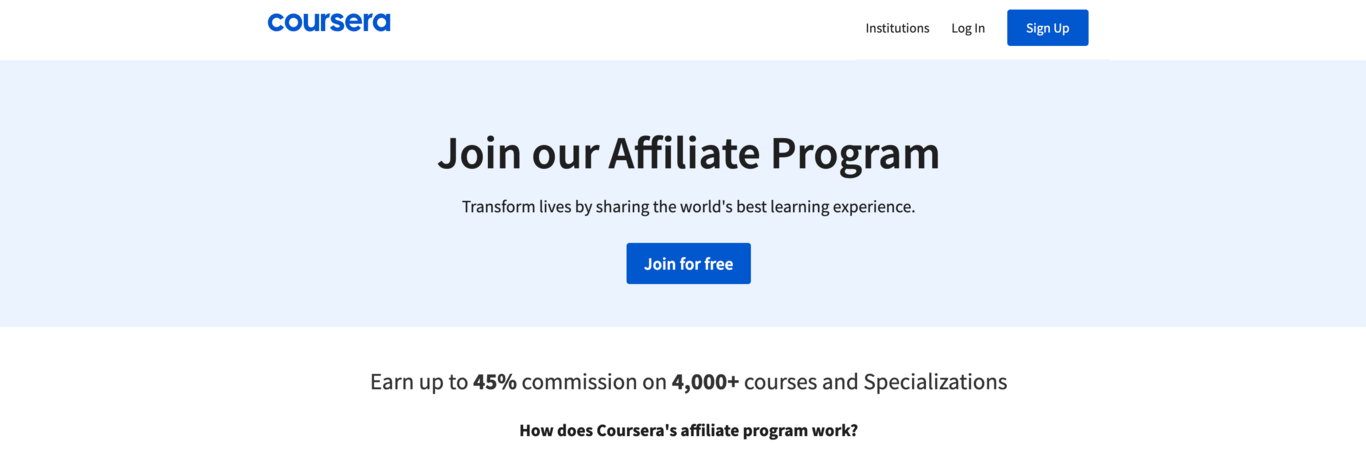
Commission: 10-45%
Cookie duration: 30 days
Coursera offers more than 3,000 courses on personal development, digital marketing, and data analytics. The courses are quite complex since they include pre-recorded videos, exercises, and homework, and each period ends with a test. Course prices vary from $29 to $99.
Affiliates can earn between 10% and 45% plus bonuses for their performance. In addition, they are provided with various promotional materials like banners, monthly bulletins, and videos.
SEMrush affiliate program

Commission: up to $200
Cookie duration: 120 days
SEMrush is a SaaS company specializing in SEO tools and solutions enabling digital businesses to analyze their competitors. SEMrush’s affiliate program offers $200 for every new subscription and $10 for every new lead. What’s worth noting is that the program offers a pretty generous cookie duration time of 120 days.
GetResponse affiliate program
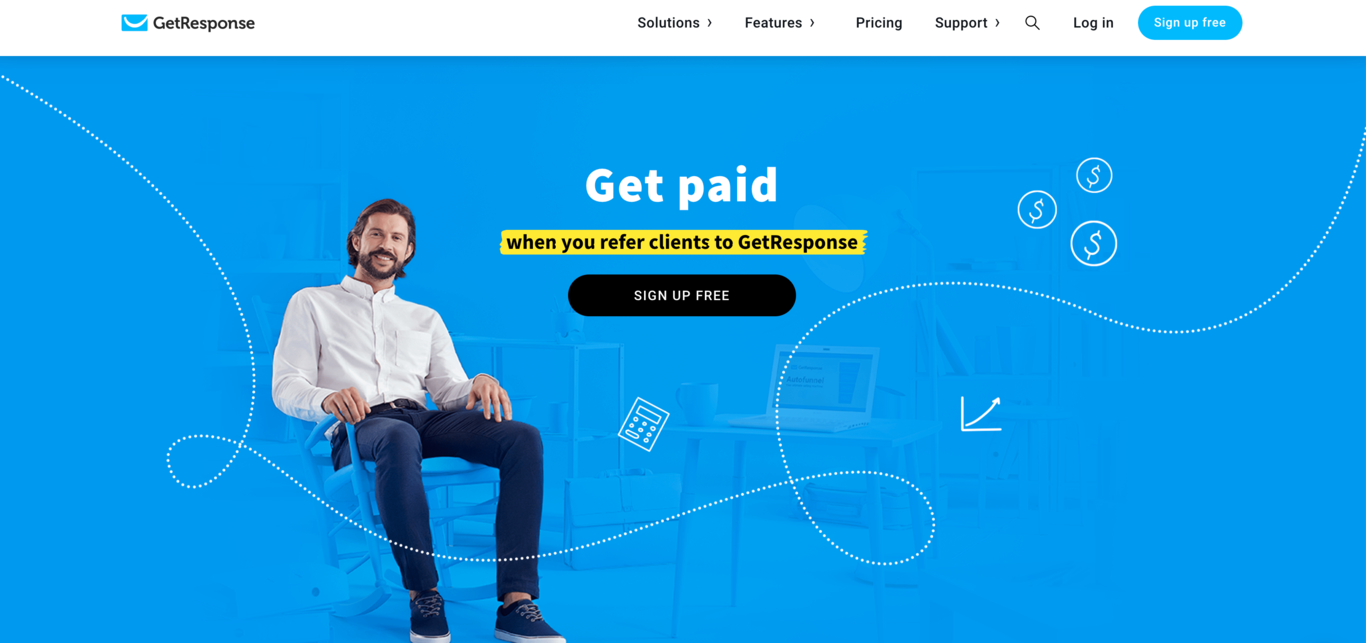
Commission: 33% recurring
Cookie duration: 120 days
GetResponse is a complex marketing software solution offering email marketing, a landing page and form creator, CRM, webinars, and other marketing automation tools.
Its affiliate marketing program offers a recurring commission fee of 33%, and with plans worth between $15 and $1,200, affiliates working with GetResponse can earn a few hundred dollars every month. Like the one run by SEMrush, this affiliate program is a good choice for marketing agencies or freelance experts supporting their clients with marketing operations.
Unbounce affiliate program
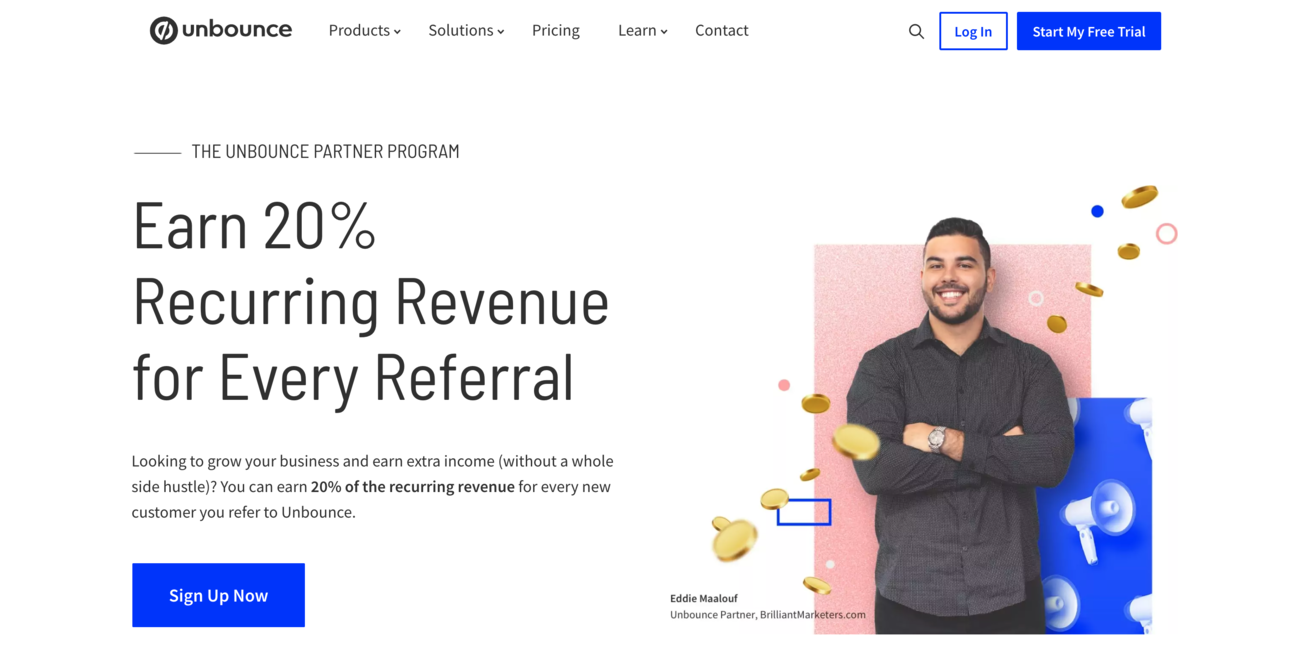
Commission: 20% for each client, recurring
Cookie duration: 90 days
Unbounce is one of the most popular custom landing page creators. It helps its users create highly converting landing pages, no matter what services they offer – an eCommerce business, marketing agency, or SaaS solution. In addition, Unbounce provides a 20% commission to its affiliates for each client they refer.
Additionally, Unbounce takes excellent care of all of its affiliates, providing them with a personalized dashboard that enables them to track their progress and find branded promotional materials.
Fiverr affiliate program

Commission: Up to $1,000 for a single conversion
Cookie duration: 30 days
Digital products offered by Fiverr can be promoted on blogs or websites of a different type. Fiverr’s affiliate program includes their flagship solution called Fiverr, which offers a range of digital services focused on marketing. The second product affiliates can promote called Fiverr Pro, which connects brands with various professionals. The third one is Fiverr learn, which offers courses for individuals and companies looking for advanced classes, primarily in marketing.
If affiliates work for clients looking for freelancers specializing in marketing, design, or software development, they can offer Fiverr Pro. If affiliates run blogs for solopreneurs or small and medium businesses owners, they may consider promoting Fiverr Learn. It’s a tool with over 5.5 million users that affiliates won’t be ashamed to promote.
Fiverr affiliates have a dedicated dashboard to manage and monitor their campaigns. In addition, they are provided with a handful of creatives they can use to promote Fiverr’s solutions.
Shopify

Shopify has over 500,000 clients in 175 countries and generated nearly $3 billion in revenue in 2020, an 86% increase compared to 2019. So after joining their program, you can simply promote Shopify’s suite of tools to people willing to start an online business and earn a pretty nice income.
Shopify is an eCommerce platform that will help you manage a successful store from website creation to shopping carts, store management, SEO, and much more. Shopify’s commission structure is very similar to the variety of products that you can promote.
You can now sell the suite package and set up stores for clients through Shopify, and in return, you will earn a 20% monthly commission when a store subscribes. In addition, with the standard affiliate link promotion, you can get a bonus worth 200% of the monthly subscription fee per referral (sic!).
Program features:
- Comes with High-Ticket products.
- Cookie duration – 30 days.
- Commission rate: 20% plus up to $2,400 per sale, 200% sign-up bonus.
- Recurring commission fees for developing stores along with Shopify Plus Referral.
Kinsta
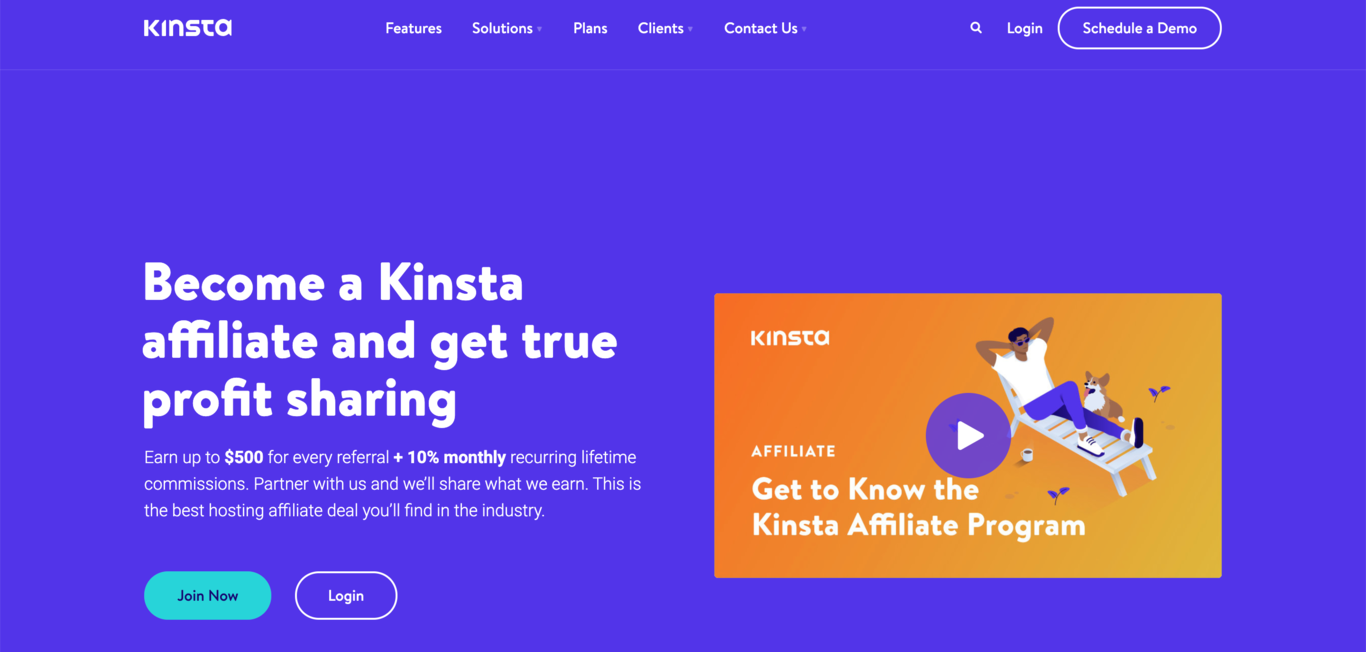
This tool falls under the umbrella of web hosting. Kinsta offers managed WordPress hosting for WordPress websites. It can also perform daily backups and free website migrations and provide top-notch security like Fort Knox.
It offers recurring affiliate commissions of “only” 10%, but that’s still a greater fee than any other web hosting company on the market.
Program features:
- A variety of promotional materials are provided.
- Lifetime value of referrals.
- Cookie duration – 60 days.
- Comes with an exclusive sign-up bonus along with recurring affiliate commission fees.
- Commissions of up to $500 per referral and 10% monthly recurring lifetime commission fees.
Instapage
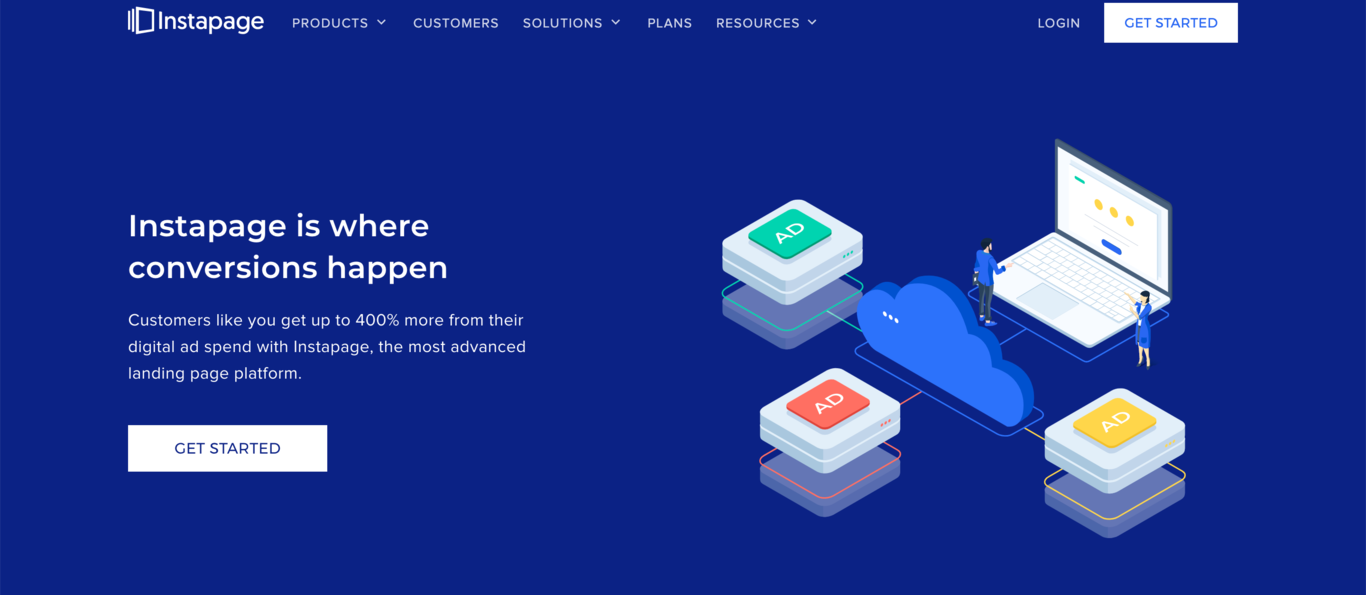
Instapage is a powerful landing page platform that helps businesses increase their conversion rates.
Instapage offers recurring commission fees of 30%. The price of their products is relatively high, which is why you can make healthy profits just by promoting their software. The price range starts from $79 and goes up to $229.
Program features:
- High recurring monthly commission fees.
- Cookie duration – 120 days.
- It has accurate and reliable tracking software.
- 50% revenue share on the first payment along with a 30% recurring commission.
Etoro

Etoro is the world’s leading social investment network on which you can trade and invest in stocks and currencies. It has built-in technology that allows you to copy the trading strategies of some of the most successful investors.
This program will pay you when any customer completes the sign-up process and makes a deposit through the Etoro platform. In addition, it offers unique banners, widgets, videos, and landing pages ready to be used for affiliate marketing activities.
Program Features:
- Etoro has paid out well over $87,580 in commission fees (as of July 2021).
- Detailed, fast, and easy-to-use reports.
- A commission rate of $160 for every customer who completes a deposit through the platform.
Proof
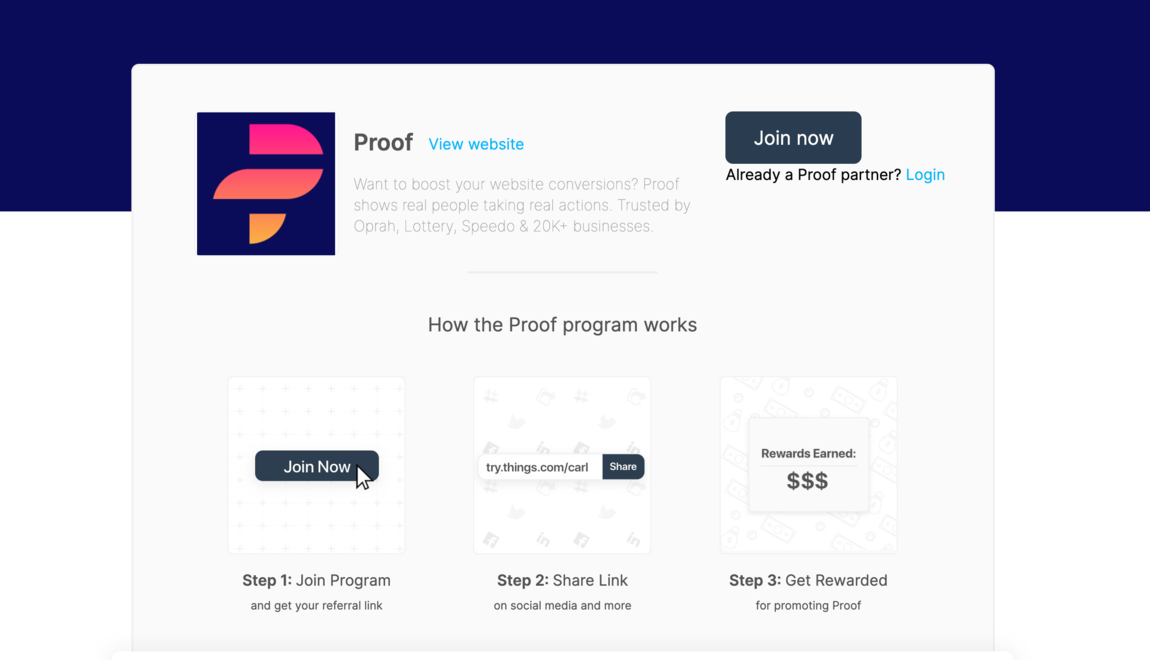
Chances are you have not come across this affiliate program. It’s a subscription software that helps business owners increase their conversations and sales by using more influential social proof.
It uses a simple and powerful pop-up window to let website visitors know that someone else has recently signed up/purchased a product. You can see it’s a simple concept, but trust us, Proof results in a considerable increase in business conversions.
Its affiliate program offers a 30% recurring (monthly) lifetime commission each month for every customer you bring on board. However, the company only awards commission fees for paying customers so that you won’t get any income for trials or leads (unlike, e.g., in the case of the SEMrush affiliate program).
Program features:
- High recurring monthly commission fees.
- A 14-day free trial period just before signing up or paying for an account.
- Commission rates of 30% up to $51.60 per referred customer monthly.
Conclusion
We hope you’ve learned what an affiliate program is and the best ones on the market right now. As you can see, companies selling digital products offer different commission rates for their affiliates. What they all have in common is the fact that the commission fees they offer are really high, with prices of up to $1,200 and commission rates around 30-40% per client.
What’s more, the quality of products or services they sell is undeniable, making it easier to attract potential customers. Finally, and most importantly, each of these companies empowers their affiliates with user-friendly dashboards to help them monitor campaigns and provide high-quality branded materials like banners, videos, or graphics.
Would you like to learn more about affiliate marketing? Our next article will provide a comprehensive overview of what an affiliate network is.
Discover more…
Would you like to create your own affiliate program? Creating an affiliate program can seem daunting at first. However, it does not have to be complicated. Using Post Affiliate Pro, companies can effectively manage all affiliates in one place. Your business can track, automate, and payout all affiliates without any hustle. The system includes tracking and reporting features, promotional materials, and multiple commission options. Moreover, it has an intuitive interface with more than 200 integrations available to ensure your workflow is as effective as possible daily.
Is Post Affiliate Pro something you might be interested in? We offer three subscription packages so that you can pick one that will be most suitable for your business. If you want more information, feel free to try out our free trials or contact our support team.

Frequently Asked Questions
What types of affiliate programs are there?
There are several types of affiliate programs, such as content programs, loyalty programs, email marketing programs, and review website programs.
Does an affiliate get paid?
Yes, affiliates receive commissions from merchants. Affiliate commissions vary according to the affiliate program you choose, but it is typically 5%.
What is an affiliate partner program?
An affiliate partner program is a marketing strategy where a company or organization partners with individuals or other businesses (affiliates) to promote their products or services in exchange for a commission or other incentives. Affiliates earn a commission for every sale or lead they generate through their promotional efforts. This type of program allows companies to expand their reach and increase sales through the efforts of their affiliates.
What is an affiliate partner program?
An affiliate partner program is a marketing strategy where a company or organization partners with individuals or other businesses (affiliates) to promote their products or services in exchange for a commission or other incentives. Affiliates earn a commission for every sale or lead they generate through their promotional efforts. This type of program allows companies to expand their reach and increase sales through the efforts of their affiliates.
Welcome to our affiliate program!
Join the Post Affiliate Pro Affiliate Program and earn a 20% recurring commission for each sale you refer! Benefit from high conversion rates, a 90-day cookie window, and get $5 just for signing up. We provide extensive support, including product demos and content development, to ensure your success. Sign up today and unlock your earning potential with one of the leading affiliate marketing platforms!
How to start an affiliate program for beginners: 7 easy steps
Discover how to launch a successful affiliate program with our beginner-friendly guide. Learn the essentials of affiliate marketing, choose the right software, and recruit effective affiliates to maximize your revenue and brand reach. Avoid common pitfalls and master tracking and managing your program. Start your journey to effortless income today!
How to start affiliate program
Discover how to start a successful affiliate marketing program with Post Affiliate Pro's step-by-step guide. Learn how to choose a profitable niche, select the right platform, and create engaging content to build your audience. Perfect for beginners, this guide emphasizes the importance of dedication and patience in the journey to affiliate marketing success. Watch now to unlock your potential and grow your online business!
Collaborator Affiliate Program
Join the Collaborator Affiliate Program for a chance to earn with a trusted content marketplace. Access platforms in diverse niches, benefit from a CPM model, and enjoy a 2% commission with a $50 minimum payout. Promote via global traffic sources, including social media. Sign up for fixed commissions and monthly payouts via PayPal or digital currencies. Perfect for influencers and digital marketers seeking extra income.
Join the UFFILIATES Affiliate Program for lucrative opportunities in the betting and gambling industry. Earn commissions through a global affiliate network with flexible campaigns and worldwide reach. Enjoy weekly payouts, starting from just 1₽, with multiple payment methods. Sign up now to maximize your earnings with top industry partners!







